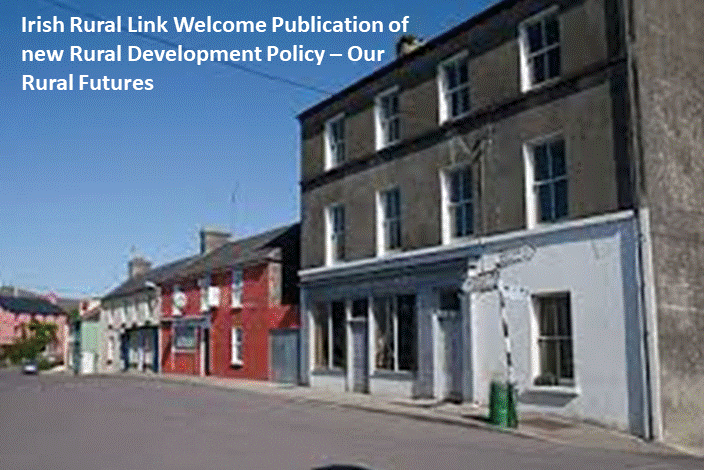Irish Rural Link Welcome Publication of new Rural Development Policy – Our Rural Futures
Irish Rural Link (IRL) – the national network representing the interest of rural communities has welcomed the launch today, 29th March 2021, of the new Rural Development Policy – Our Rural Futures 2021 – 2025.
IRL are hopeful that this policy document will set out a roadmap of how rural communities can develop over the next 5 years while also set out measures to recover from the impact of Covid-19. IRL have engaged with the Department and Minister for Rural and Community Development over the past two years and at the first look of the policy document we welcome that some of the lessons learnt from Covid-19 will be built on.
Rural communities have a lot to offer in terms of how they want the future of rural to look like. They also have key roles to play in addressing climate change and transitioning to a zero carbon society but communities must be engaged with every step of the way and supports made available to both households and communities who need to make the necessary changes to help achieve this. Workers, some who have already lost their jobs and with more losing theirs in the coming years as we move away from peat harvesting must be engaged with early on in the process and have courses to upskill and/or reskill available to them before the jobs end.
Incentivising people to live and work in rural areas must be met with proper investment in public services – such as a robust public transport system, high speed broadband, access to clean water and waste water systems and decent and affordable housing close to these services and local village are available.
IRL saw first-hand the importance of community in rural areas during the Covid-19 pandemic and the strength of people coming together to make sure no person was left behind. This must be a pivotal aspect of this new policy document. A lot of this was made possible by more people working from home and we have long supported remote working as a way of creating jobs and building sustainable rural communities. We welcome that more investment will be made into co-working spaces in rural areas, which will allow people to continue to work close to where they live once the pandemic is over. We call for support from employers, whether SME’s or large multinational organisations to facilitate their employees to work from these hubs and have a better work-life balance.
The role of community and voluntary organisations in delivering health and social care services, such as meals on wheels, is critical to communities. Supporting the development of such organisations so they can continue to support people age in their communities must be a key factor in this new rural policy. These services were crucial during Covid-19 and will remain crucial into the future as we address the needs of an ageing population.
We welcome that one of the aims is to grow regional employment by creating an environment that supports entrepreneurship and enterprise growth in rural areas. There are a lot of emerging sectors in terms of the green and digital economy where rural areas can be at the forefront of job creation. Access to finance and funding continues to be one of the main barriers for entrepreneurs to start up a business but also to grow their business. This and other barriers to starting a business and how these can be addressed will be important to achieve this aim. Collaborations between entrepreneurs, business groups and universities/technological universities will be key over the next 5 years to ensure the creation of innovative new businesses and jobs in rural areas.
The tourism sector has been one of the hardest hit by Covid-19 but is one of the key sectors in rural areas with a lot of communities depending on the sector for job creation. Supporting those businesses to recover from the pandemic must be a key priority but also making jobs in the sector more viable. As the sector reopens there is an opportunity to make it more sustainable, ensuring communities can directly benefit while at the same time the environment and cultural and heritage sights are not negatively impacted by over-tourism.
While the policy document looks good on paper, the success of its implementation needs the political will from all of Government and policy cohesion with other Government policies. The measures outlined must be properly resourced with adequate budget allocations to ensure that all measures are realised within the given timeframe. There is also a responsibility on all of us to engage with different schemes and services that are available and make use of these to develop our local areas.
IRL look forward to working with the Government on the implementation of this policy.
The new Rural Development Policy is available on https://www.gov.ie/en/publication/4c236-our-rural-future-vision-and-policy-context/ -Ends-
For further information, please contact (anytime):
Seamus Boland (Chief Executive) 086 2491153 or Louise Lennon (Policy and Communications Officer) 086 1069244

